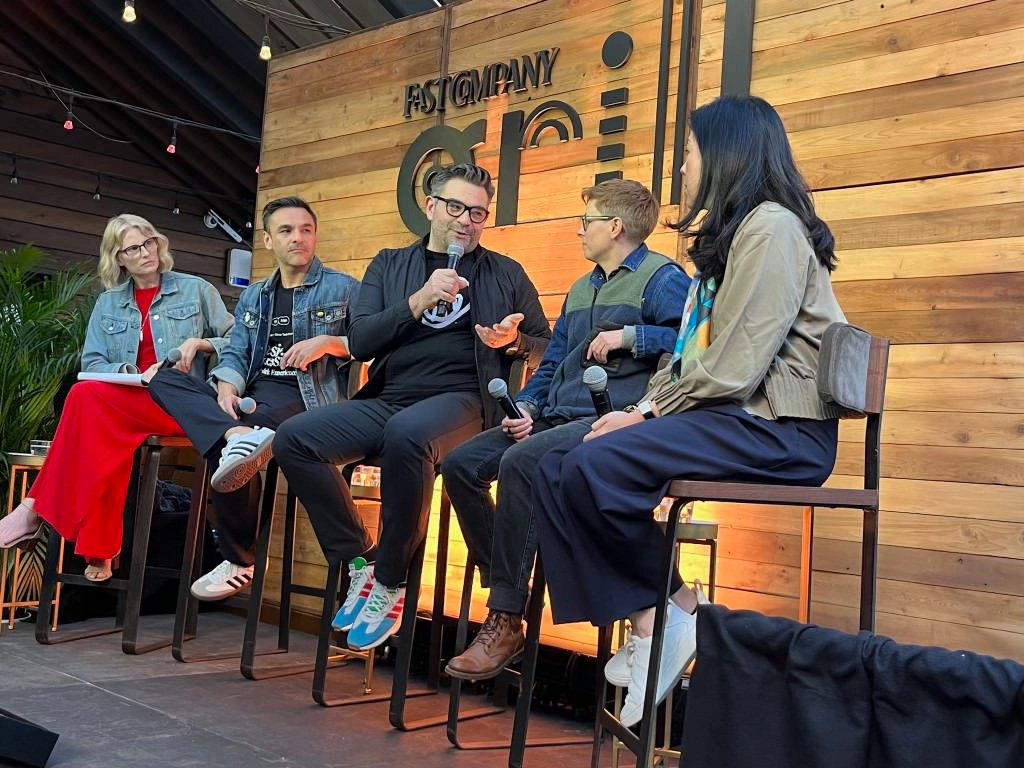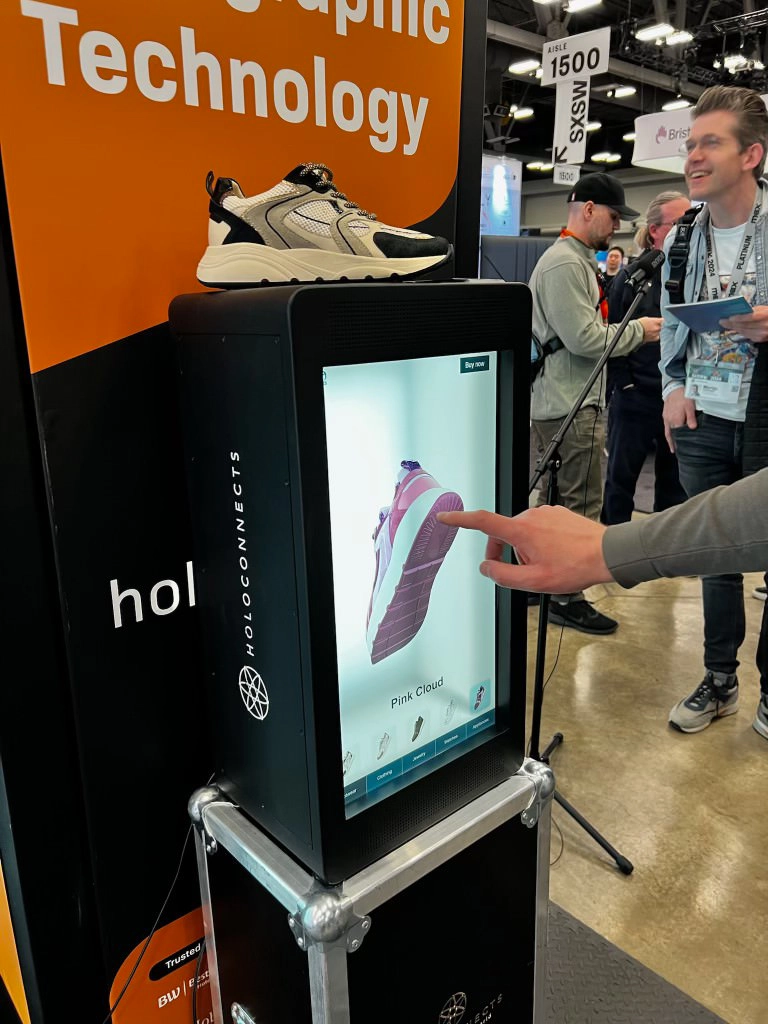March 26, 2024
SXSW 2024: AI, designing for impact, and the future of brand

Takeaways from Lippincott’s Global Head of Experience, Innovation and Engineering.
As a veteran of tech events, the sights and sounds of exhibition halls, keynote speeches, and networking sessions are all too familiar. Yet SXSW 2024 in Austin, Texas, managed to transform that standard mix into a vibrant kaleidoscope of innovation and creativity.
Stepping into SXSW 2024, I found myself immersed in themes many of us are grappling with in design and innovation today—from climate change and energy to diversity, creator communities, and health, all showcased through the leading edge of design, artificial intelligence (AI), extended reality, and more.
During the event, I had the honor of contributing to many powerful discussions. From our own Lippincott-moderated panel on AI: "AI is not going to take your job, but someone who knows how to use it will" to attending the exclusive AI Trailblazers event to getting to join editor Amy Farley on Fast Company’s innovation & design track, I got to cover branding in the new era of technology, designing sustainably, creating for impact, the vast world of artificial intelligence and data empowerment, and the ethical considerations that must guide our journey into the future.
The journey through SXSW 2024 has been nothing short of inspirational, offering a treasure trove of insights and ideas that fuel our collective passion for innovation, creativity, and ethical progress in the age of AI. Here’s a quick look at what I learned.
01 | Unleashing the ‘unicorns’
Moderating the panel “AI Isn't Going to Take Your Job, But Those Using It Will,” I was privileged to lead a discussion with industry luminaries from Expedia Group, Samsung Electronics America, and Shutterstock. We set out to debunk common myths and illuminate the transformative potential of AI when leveraged with insight and creativity. The collective wisdom of our speakers painted a compelling picture of the road ahead, highlighting a unified vision for an AI-powered future characterized by the strategic use of data, a steadfast commitment to ethics, and the personalization of technology. These insights reinforced the notion that AI is not a harbinger of job obsolescence but a catalyst for growth and innovation, creating a new breed of marketers—‘unicorns’ capable of seamlessly integrating content creation with coding.
Highlights included:
Democratizing data for innovation
Chandreyi Saha Davis, Global VP of Brand Marketing at Expedia Group emphasized the crucial role of data democratization in fostering a culture of experimentation, enhancing AI literacy, and propelling business innovation. By making over 70 petabytes of data accessible for experimentation, Expedia has fostered an environment where AI literacy flourishes, thereby catalyzing innovation. Davis's narrative underscored the essence of AI in enhancing brand storytelling and creating a more dynamic, responsive engagement with users, highlighting the potential of data to not just inform but transform how businesses engage with AI.
Championing ethical AI
The dialogue took an ethical turn with Allison Sitzman, VP of Integrated Brand and Product Marketing at Shutterstock, who passionately advocated for the importance of ethically sourced data. Shutterstock's commitment to a trust framework signals a vital industry trend towards transparency and responsibility in AI development. This stance resonates with a broader industry imperative for ethical considerations to be at the forefront of AI innovation.
Allison highlighted the paramount importance of ethically sourced data and content, underpinning Shutterstock's commitment to ethical AI practices through its trust framework. She provided a compelling look into the ethical dimensions of AI, particularly in the realm of content creation. By launching their TRUST framework, Shutterstock has positioned itself as a vanguard in the responsible use of AI, ensuring that the future of AI-powered solutions remains grounded in ethical sourcing and application of content. Sitzman's insights painted a picture of a future where AI’s power is harnessed with a keen sense of responsibility and transparency.
Personal AI as the future of tech
Blake Gaiser, Director of Smartphone Product Management at Samsung Electronics America, provided a glimpse into the potential of personal AI, emphasizing the significance of mobile and personalized AI solutions. He spotlighted Samsung’s efforts to make AI more accessible and integral to individual experiences through initiatives like Galaxy AI, which brings mobile access to generative AI. Gaiser’s vision for technology that is intimately tailored to individual needs and preferences captures the essence of the next frontier in AI development, showcasing the potential of AI to be a personal companion, enhancing everyday life with tailored, intuitive interactions.
In addition to our own panel on AI, I had the privilege of immersing myself in the vibrant AI community at the AI Trailblazers event. This exclusive gathering brought together 90 marketing, product, and technology business leaders, alongside AI visionaries, authors, and startup founders, to delve into the world of AI and its impact on SXSW.
02 | A showcase of AI innovation
The AI Trailblazers event was a tapestry of inspiration, dynamism, and entertainment. The evening commenced with an engaging AI Showdown, where five finalists, chosen from over 100 AI startup candidates, pitched their groundbreaking solutions to a distinguished panel of judges.
The finalists were an exciting array of disruptors across the AI landscape:
- Providing deep healthcare insights through machine learning
- An AI & Data Governance solution verifying digital content
- Elevating video advertising with AI-generated branded objectives
- Streamlining brand-first content production for marketers
- Ethical facial analysis measuring demographics, sentiment, and more
Two key takeaways here:
- AI doesn’t need to be in the cloud to be effective
- Every aspect of the marketing industry (not just the creative aspect) has an opportunity to be improved with AI



03 | Designing for impact
Fast Company extended an invitation to participate in a panel of exceptional designers at their innovative SXSW sideshow: The Fast Company Grill. This multi-day event convened a diverse group of thinkers from across the design ecosystem to explore how they identify and tackle challenges worth solving, and how they translate ideas into action.
My fellow panelists included:
Dawn Lim, executive director of DesignSingapore Council, the country’s national agency for design
Eli Robinson, a UX designer with experience ranging from Google’s Waymo autonomous vehicles project to the LGBTQ-focused telehealth platform FOLX
Gerardo Ortiz, cofounder of Brands&People, a branding agency based in Monterrey, Mexico, and Austin
And yours truly, representing Lippincott’s perspective on digital transformation and brand experiences. Here's what we covered.
Prototyping at scale
Dawn Lim shared insights on how DesignSingapore collaborates with designers, policymakers, scientists, and engineers to develop creative solutions for pressing challenges in healthcare, aging, and food resilience. She highlighted Singapore’s unique position as a testbed for scalable solutions, with regulatory sandboxes for alternative proteins and lab-grown meats. Lim emphasized the importance of resonating with users and finding ‘design nudges’ to encourage adoption, such as offering grocery vouchers to seniors based on their physical activity levels.
Meeting people where they are
Gerardo Ortiz recounted his agency’s innovative approach to a fundraising campaign for a cancer research institute in Mexico. By leveraging instant messaging to allow people to broadcast messages of love and support to friends in the hospital via waiting-room TVs, and rerouting SMS fees to the fundraising campaign, they successfully gathered 15,000 donations in just three months. This exemplifies the power of understanding the target audience and reducing friction in the user experience.
Experiment, implement, and embrace AI
Eli Robinson stressed the importance of distinguishing between perceived and real problems in the design process, ensuring that solutions address the core issues at hand. She and I had a fascinating back and forth about the bizarre thing we do as humans—assigning a personality to objects and things we interact with, especially when they frustrate us. A phenomenon that will prove to be quite powerful as machines develop personalities in the coming years.
From my perspective at Lippincott, I emphasized the significance of getting “at eye level with people” when approaching experience design. I highlighted the potential of generative AI to assist in information gathering and idea generation, urging designers to move beyond experimentation and into implementation. The rise of AI has transformed professionals across various fields into makers, democratizing the creative process.
Dawn Lim shared Singapore’s comprehensive plan for embracing AI, starting with educating children on leveraging generative AI tools and extending to government applications, such as an automated hotline for reporting potholes and street issues.
The Fast Company Grill panel provided a platform to explore the intersection of design, technology, and social impact, showcasing the transformative potential of human-centered design in addressing global challenges.
SXSW 2024 proved to be an extraordinary platform for exploring the intersection of innovation, ethics, and social impact. The event showcased how AI, when approached with creativity, responsibility, and inclusivity, can be a catalyst for transformative growth and positive change across industries.
Through thought-provoking discussions and a showcase of groundbreaking technologies, SXSW 2024 deepened our understanding of the role of AI in shaping the future of branding, design, and marketing. It also highlighted the critical importance of maintaining a human-centered perspective and a commitment to ethical practices as we navigate the complexities of our rapidly evolving world.






